英语语法之倒装句
语法:英语倒装

语法:英语倒装1.概念:有时由于语法或修辞的需要将谓语的部分或全部提到主语前面,这样的语序叫做倒装:①语法结构的需要通常体现在疑问句、there be 结构等需要用倒装句;②语法修饰的需要:倒装句可以起强调作用,加强语气。
2.分类:英语最基本的词序是主语在谓语动词的前面。
如果将句子的主语和谓语完全颠倒过来,这称之为完全倒装。
如果只将助动词或情态动词移至主语之前,谓语的其他部分仍保留在主语的后面,这称之为部分倒装。
3.用法:Ⅰ.完全倒装是将谓语的全部放在主语之前,此结构通常只用于一般现在时和一般过去时两种,例如:On her left sat her husband. 她左边坐着她丈夫。
Here is the book you want. 你要的书在这儿。
Down went the small boat. 小船沉下去了。
Ⅰ.部分倒装是指将谓语的一部分,如助动词或情态动词,移至主语之前。
Only by working hard can one succeed. 只有努力才能成功。
Never have I seen her before. 我以前没见过她。
注意:如果句中的谓语没有助动词或情态动词,则需添加助动词do, does或did,并将其置于主语之前。
4.常见倒装句式:Ⅰ. There be句型;A book is there on the desk.→There is a book on the desk.An old man lives there by the sea.→There lives an old man by the sea.Ⅰ. here、there、now、then等开头的句子;Here comes the bus! / Now comes your turn.但是注意,如果主语是人称代词,则不倒装,如:Here you are. / There she comes.Ⅰ. 当表示地点的介词词组在句首;At the foot of the hill lies a beautiful lake.Under the tree was lying a cat.Ⅰ. 句首为否定或半否定的词语;如no, not, never, seldom, little, hardly, at no time, in no way, not until…等。
英语语法 倒装句有哪些常见的类型
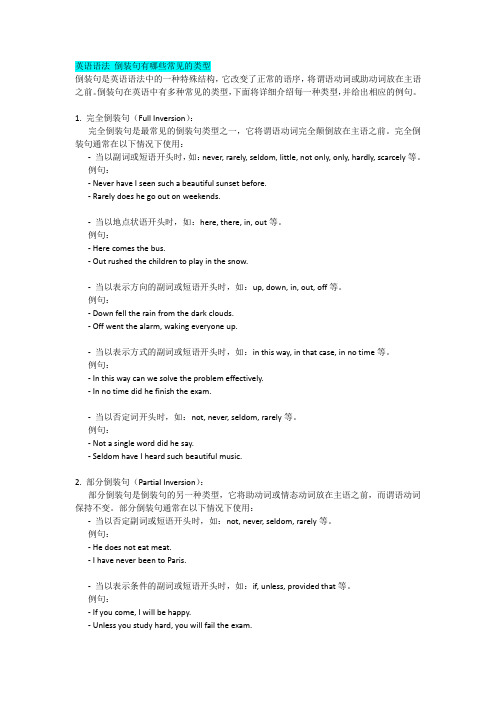
英语语法倒装句有哪些常见的类型倒装句是英语语法中的一种特殊结构,它改变了正常的语序,将谓语动词或助动词放在主语之前。
倒装句在英语中有多种常见的类型,下面将详细介绍每一种类型,并给出相应的例句。
1. 完全倒装句(Full Inversion):完全倒装句是最常见的倒装句类型之一,它将谓语动词完全颠倒放在主语之前。
完全倒装句通常在以下情况下使用:-当以副词或短语开头时,如:never, rarely, seldom, little, not only, only, hardly, scarcely等。
例句:- Never have I seen such a beautiful sunset before.- Rarely does he go out on weekends.-当以地点状语开头时,如:here, there, in, out等。
例句:- Here comes the bus.- Out rushed the children to play in the snow.-当以表示方向的副词或短语开头时,如:up, down, in, out, off等。
例句:- Down fell the rain from the dark clouds.- Off went the alarm, waking everyone up.-当以表示方式的副词或短语开头时,如:in this way, in that case, in no time等。
例句:- In this way can we solve the problem effectively.- In no time did he finish the exam.-当以否定词开头时,如:not, never, seldom, rarely等。
例句:- Not a single word did he say.- Seldom have I heard such beautiful music.2. 部分倒装句(Partial Inversion):部分倒装句是倒装句的另一种类型,它将助动词或情态动词放在主语之前,而谓语动词保持不变。
英语语法 什么是倒装句

英语语法什么是倒装句倒装句是一种特殊的语法结构,在英语语法中有着重要的地位。
正常语序中,主语通常出现在动词之前,而倒装句则将动词或助动词置于主语之前,或者将整个谓语或短语置于主语之前。
这种颠倒的语序在英语中具有特殊的语法和修辞效果,常用于强调、疑问、条件句等语境中。
以下是倒装句的几种常见形式和用法:1. 完全倒装:将助动词或系动词放在主语之前。
例如:- Never have I seen such a beautiful sunset.- Only in dreams can we truly fly.2. 部分倒装:将助动词、情态动词或动词的某些部分放在主语之前。
例如:- Hardly had he arrived when the phone rang.- Not only did she finish the report, but she also submitted it early.3. 带有否定词的倒装:将否定词放在句首,然后倒装动词和主语的顺序。
例如:- Never have I felt so alone.- Not until the rain stopped did they go outside.4. 疑问倒装:将助动词或情态动词提到句首,以形成疑问句。
例如:- Is he coming to the party?- Can you speak French?5. 条件句中的倒装:当条件句以介词短语或副词短语开头时,常常使用倒装结构。
例如:- In case of fire, break the glass.- Should you need any assistance, please let us know.倒装句的使用可以使句子更具有强调和修辞效果,增加句子的变化和多样性。
但需要注意的是,倒装句的使用需要根据具体的语境和句子结构来判断,不是所有情况下都适用。
因此,在使用倒装句时,需要注意语法规则和语义逻辑的准确性。
英语语法之倒装句
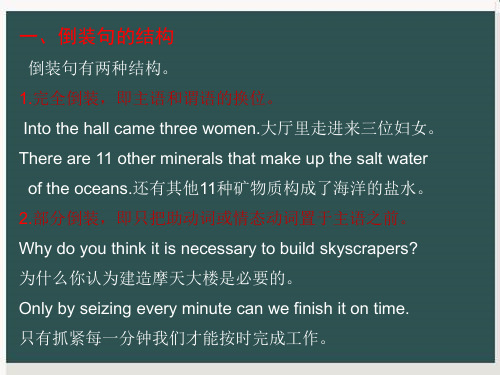
2.含有否定的句子 ①否定并列连词nor连接的并列句,后句需要部分倒装。 I'm not tired now, nor am I thirsty or hungry. 我现在不累,不渴也不饿。 ②否定连接副词neither连接的并列句,后句需要部分倒装。 I can't swim. Neither can he. 我不会游泳。他也不会。(连接两个句子)
③介词短语作为地点状语置于句首,后面如果有lie, live,sit,stand, come, go等动词,全句需要完全倒装。 Into the hall came three women. 大厅里走进来三位妇女。 Along the dustyroad came a group of tourists. 沿着这条尘土飞扬的大路,来了一样游客。
③否定副词never,seldom, rarely等置于句首表强调时,需部分 或完全倒装。 Seldom in all my life have I met such adetermined person. 我一生中很少遇到过这样坚定的人。 ④否定词not后跟often,once,ever等副词置于句首表强调时, 需部分或完全倒装。 Not once did wevisil the city on our own. 我们没有一次独自访问这座城市, Not ever was she nervous during the climb to the summit of Mt. Qomolungma. 她在爬上珠穆朗玛峰峰顶时也没有紧张过。
二、倒装句的种类
(一)常见情况
一般疑问句 特殊疑问句 存在句 祝愿句 直接引语置于句首常倒装
(二)特殊情况
1.虚拟语气条件从句如省略了从属连词if从句则需要部分倒 装。 Had I not seen it with my own eyes, I would not h会相信的。
倒装句语法知识点归纳总结
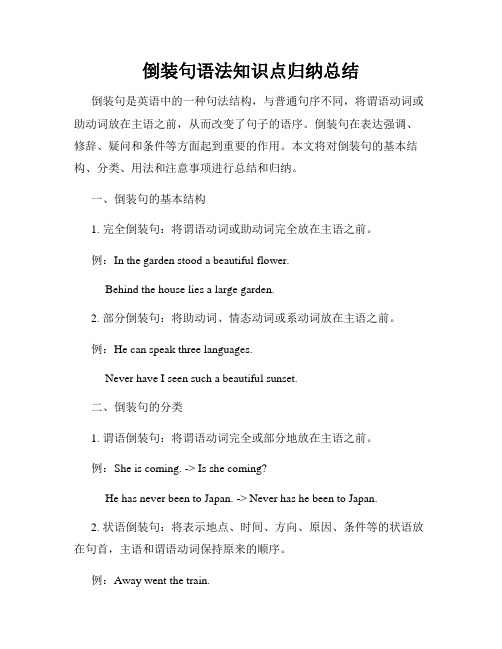
倒装句语法知识点归纳总结倒装句是英语中的一种句法结构,与普通句序不同,将谓语动词或助动词放在主语之前,从而改变了句子的语序。
倒装句在表达强调、修辞、疑问和条件等方面起到重要的作用。
本文将对倒装句的基本结构、分类、用法和注意事项进行总结和归纳。
一、倒装句的基本结构1. 完全倒装句:将谓语动词或助动词完全放在主语之前。
例:In the garden stood a beautiful flower.Behind the house lies a large garden.2. 部分倒装句:将助动词、情态动词或系动词放在主语之前。
例:He can speak three languages.Never have I seen such a beautiful sunset.二、倒装句的分类1. 谓语倒装句:将谓语动词完全或部分地放在主语之前。
例:She is coming. -> Is she coming?He has never been to Japan. -> Never has he been to Japan.2. 状语倒装句:将表示地点、时间、方向、原因、条件等的状语放在句首,主语和谓语动词保持原来的顺序。
例:Away went the train.In the distance could be seen a tall tower.3. 主从倒装句:主句和从句中的主语-谓语结构进行倒装。
例:Not until she finished her homework did she go to bed.Only when the rain stopped could we go outside.三、倒装句的用法1. 强调句:通过倒装句,可以将句子的某一部分进行强调,常用的结构是完全倒装句和部分倒装句。
例:Not only did he win the game, but he also broke the record.Under no circumstances should you touch the red button.2. 疑问句:直接将谓语动词或助动词放在主语之前形成疑问句。
英文倒装句语法
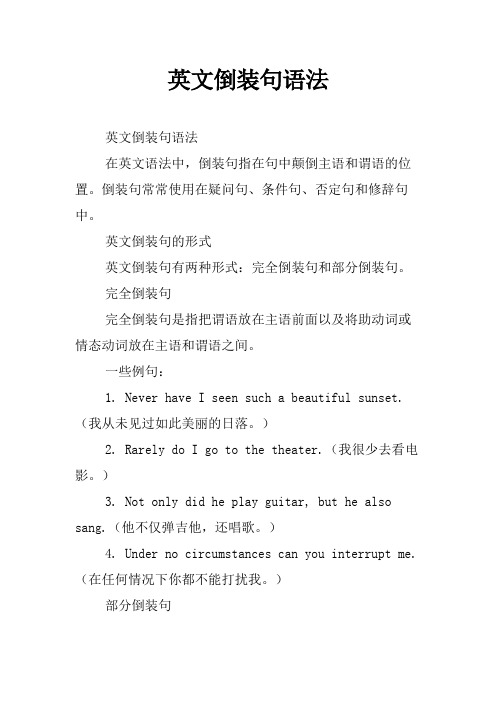
英文倒装句语法英文倒装句语法在英文语法中,倒装句指在句中颠倒主语和谓语的位置。
倒装句常常使用在疑问句、条件句、否定句和修辞句中。
英文倒装句的形式英文倒装句有两种形式:完全倒装句和部分倒装句。
完全倒装句完全倒装句是指把谓语放在主语前面以及将助动词或情态动词放在主语和谓语之间。
一些例句:1. Never have I seen such a beautiful sunset.(我从未见过如此美丽的日落。
)2. Rarely do I go to the theater.(我很少去看电影。
)3. Not only did he play guitar, but he also sang.(他不仅弹吉他,还唱歌。
)4. Under no circumstances can you interrupt me.(在任何情况下你都不能打扰我。
)部分倒装句部分倒装句是指把助动词或情态动词放在句首,把主语放在中间,谓语动词放在后面。
一些例句:1. She can't come to the party, nor can her boyfriend.(她不能来聚会,她的男友也不行。
)2. John has been to Paris, and so have I.(约翰去过巴黎,我也去过。
)3. I never realized how much I loved him until he was gone.(直到他走了,我才意识到我有多爱他。
)4. Not until she left did he realize how important she was to him.(直到她走了,他才意识到她对他有多重要。
)英文倒装句的用途英文倒装句有多种用途,如下:1. 疑问句英文倒装句经常用于疑问句的形式,例如:Do you understand?(你懂吗?)Is she coming?(她来吗?)Can you swim?(你会游泳吗?)注意:在使用助动词和情态动词的情况下,这种疑问形式通常是“动词+主语”。
倒装语法知识点总结
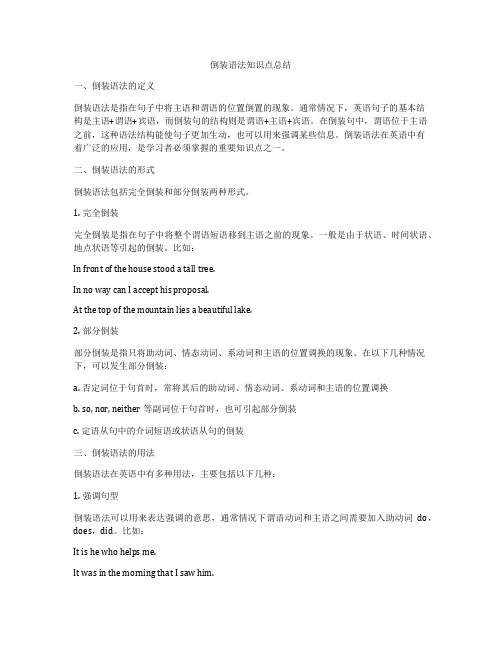
倒装语法知识点总结一、倒装语法的定义倒装语法是指在句子中将主语和谓语的位置倒置的现象。
通常情况下,英语句子的基本结构是主语+谓语+宾语,而倒装句的结构则是谓语+主语+宾语。
在倒装句中,谓语位于主语之前,这种语法结构能使句子更加生动,也可以用来强调某些信息。
倒装语法在英语中有着广泛的应用,是学习者必须掌握的重要知识点之一。
二、倒装语法的形式倒装语法包括完全倒装和部分倒装两种形式。
1. 完全倒装完全倒装是指在句子中将整个谓语短语移到主语之前的现象。
一般是由于状语、时间状语、地点状语等引起的倒装。
比如:In front of the house stood a tall tree.In no way can I accept his proposal.At the top of the mountain lies a beautiful lake.2. 部分倒装部分倒装是指只将助动词、情态动词、系动词和主语的位置调换的现象。
在以下几种情况下,可以发生部分倒装:a. 否定词位于句首时,常将其后的助动词、情态动词、系动词和主语的位置调换b. so, nor, neither等副词位于句首时,也可引起部分倒装c. 定语从句中的介词短语或状语从句的倒装三、倒装语法的用法倒装语法在英语中有多种用法,主要包括以下几种:1. 强调句型倒装语法可以用来表达强调的意思,通常情况下谓语动词和主语之间需要加入助动词do,does,did。
比如:It is he who helps me.It was in the morning that I saw him.It is from him that I heard the news.2. 省略连接词的句子当省略从句的连接词或副词时,可以用倒装语法来表示。
比如:Should you come, please let me know.If you need any help, just give me a call.Wherever she goes, there is always a crowd of people around her.3. 特殊疑问句在特殊疑问句中,如果询问的是某个特定的内容,通常要用到倒装语法。
英语倒装句语法
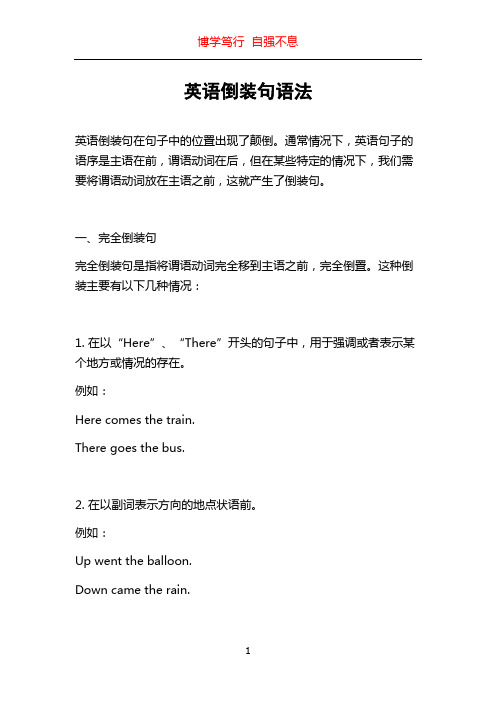
英语倒装句语法英语倒装句在句子中的位置出现了颠倒。
通常情况下,英语句子的语序是主语在前,谓语动词在后,但在某些特定的情况下,我们需要将谓语动词放在主语之前,这就产生了倒装句。
一、完全倒装句完全倒装句是指将谓语动词完全移到主语之前,完全倒置。
这种倒装主要有以下几种情况:1. 在以“Here”、“There”开头的句子中,用于强调或者表示某个地方或情况的存在。
例如:Here comes the train.There goes the bus.2. 在以副词表示方向的地点状语前。
例如:Up went the balloon.Down came the rain.3. 在以“Only+状语”、“Not only+状语”开头的句子中。
例如:Only by working hard can you achieve success.Not only did he pass the exam, but he also got the top score.4. 在以“so/such+形容词/副词+名词”开头表示程度的句子中。
例如:So noisy was the party that I couldn't sleep.Such great progress have we made in science and technology.二、部分倒装句部分倒装是指将助动词或情态动词提到主语之前,而谓语动词仍然保持在主语之后。
这种倒装一般发生在以下几种情况:1. 在以“neither/nor”开头的句子中。
例如:Neither has she seen the movie, nor has she read the book.2. 在以“not+动词”、“no sooner+副词”、“hardly/scarcely+副词”开头的句子中。
例如:Not a single word did he say.No sooner had I arrived than it started to rain.Hardly had he left the house when it started to snow.3. 在以“never/seldom+谓语动词”开头的句子中。
- 1、下载文档前请自行甄别文档内容的完整性,平台不提供额外的编辑、内容补充、找答案等附加服务。
- 2、"仅部分预览"的文档,不可在线预览部分如存在完整性等问题,可反馈申请退款(可完整预览的文档不适用该条件!)。
- 3、如文档侵犯您的权益,请联系客服反馈,我们会尽快为您处理(人工客服工作时间:9:00-18:30)。
倒装句
1. so + 助动词/be动词/情态动词+ 主语
某人(物)也是这样
neither + 助动词/be动词/情态动词+ 主语
某人(物)也不/没…
Frank is generous. So is George.
I watched that movie yesterday. So did Zac.
Frank isn’t generous. Neither is George.
I didn’t watch that movie yesterday. Neither did Zac.
2. There be … “存在”
主语在be动词后
There is a dog in the yard.
There are five apples on the table.
3. 表示方位或方式的副词或介词短语,如:here, there, up, down, away, back, off, out, on, in front of the building等,位于句首,且主语是名词时。
介词短语+谓语vi+主语
In front of the building stands a tower.
Away went the old lady.
In came the manager.
Here comes the bus.
注意:
主语是代词时,不倒装。
Here you are.
In he came.
4. such置于句首时。
Such is human nature.
Such are the facts.
将下列句子转变为倒装句。
There was a sudden gust of wind and his hat went away.
There was a sudden gust of wind and away went his hat.
The door burst open and the crowd rushed in.
The door burst open and in rushed the crowd.
The nurse’s voice came from a speaker on the wall.
From a speaker on the wall came the nurse’s voice.
5.倒装: No sooner + 助动词+ 主语+ 动词
No sooner had he returned than he bought a house and
went to live there.
No sooner had I opened the door than the phone rang.
6.倒装: Hardly + 助动词+ 主语+ 动词
Hardly had he had time to settle down when he sold the house and left the country.
Hardly had I taken my seat in the theater when the play began.
主谓倒装:全部倒装,部分倒装(谓语动词只有部分移到主语前)
陈述句变一般疑问句,就是部分倒装;
Only句首,部分倒装;否定词提前,部分倒装。
表强调!
Only on one occasion have I ever felt frightened.
You will never know the truth.——Never will you know the truth.
He cares little for my words.——Little doed he cares for my words.
I had no sooner got the invitation than I refused.——No sooner had I got the invitation than I refused.
Hardly had he had time to settle down when he sold the house and left the country.
Hardly had I taken my seat in the theater when the play began.
We can learn English well only in this way.——Only in this way can we learn English well. He achieved his goal only by working hard.——Only by working hard did he achieved his goal.
部分倒装
只把助动词,be 动词(之前没有其他助动词)或情态动词置于主语之前。
1、否定词位于句首(如:not only, not until, neither, nor, never, hardly, barely, scarcely, few, little, rarely, seldom, under no circumstances, in no way, …)。
Not only had the poor man been arrested, but he had been sent to prison as well.
Nor is the city without its moments of beauty.
Neither was I surprised when the train stopped at Widley, a tiny station a few miles along the line.
Never have I seen such a good movie.
Not until yesterday did little John change his mind.
Under no circumstances should you lend Paul any money.
2、“only + 状语” 位于句首。
Only then did he realize that he was mistaken.
Only by working hard can we succeed in doing anything.
Only after a baby seal is pushed into the sea by its mother will it learn how to swim.
Only when he saw that the man was actually telephoning the police did he realize that they had all been the victims of a hoax.
3、such, so, well, often, many a time 等表示程度、频率的副词位于句首。
Such is human nature, that a great many people are often willing to sacrifice higher pay for the privilege of becoming white-collar workers.
So great is our passion for doing things for ourselves, that we are becoming increasingly less dependent on specialized labour.
Well did I know him and well did he know me.
often did it snow there.
Many a time has he given me good advice.
造句:你不但吓了我一跳,而且可能把村子里所有人都吵醒了。
Not only did you give me a surprise, but you've probably woken up everyone in the village as well.
造句:不但有几个人抱怨说在夜里听见了“像猫一样的噪音”,而且一位钓鱼途中的商人还看见那只美洲狮在树上。
Not only did several people complain of ‘cat-like noises’ at night, but a businessman on a fishing trip saw the puma up a tree as well.。
